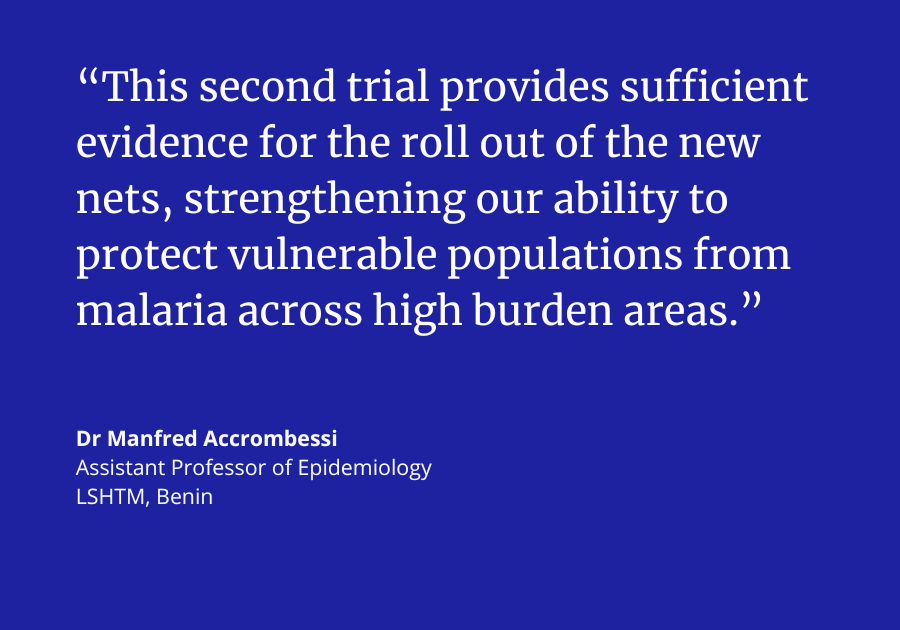
Building on the work of the New Nets project, bed nets treated with a novel class of insecticide reduced malaria infections by 46% among children between the ages of 6 months and 10 years in a randomised controlled trial in Benin, published in The Lancet today.
Long-lasting insecticidal nets are the cornerstones of malaria control in sub-Saharan Africa. However, in the past few years the decline in malaria has stalled and even reversed in some countries. In 2020, there were 627,000 deaths from malaria, predominantly in Africa and occurring mostly in children.
Malaria’s resurgence is partly due to the bed nets’ effectiveness being compromised by widespread resistance to pyrethroid insecticides in Anopheles mosquitoes. The insecticide, Chlorfenapyr, works very differently to pyrethroid, causing wing muscle cramps that stop the flight muscles from functioning. This prevents mosquitoes from making further host contacts or biting, ultimately leading to their death.
'Mosquitoes are becoming increasingly resistant to the pyrethroid insecticides used on insecticidal treated nets, explains Professor Akogbeto, co-author of the study and Medical Entomologist at Centre de Recherches Entomologiques de Cotonou (CREC), Benin, 'this reduces the nets’ ability to protect people from malaria, so we must continue to develop and test new tools that have proven public health value and extend the effectiveness of existing tools against resistant mosquitoes.'
Over the two-year study, the Interceptor® G2 nets delivered significantly improved protection from malaria compared to standard nets. This study follows the publication of a sister epidemiological trial carried out in Tanzania and published in The Lancet in 2022. The results of the randomised control trial (RCT) also demonstrated significant reduction in malaria prevalence over a 24-month period, with a reported case incidence reduction of 44% .
A criticism could be levelled at the high cost of chlorfenapyr LLINs, but these are offset by the savings from reducing the number of malaria cases requiring treatment. Distributing chlorfenapyr nets is therefore expected to cost households and society less overall than standard, PBO, or pyriproxyfen nets.
Both trials were delivered through the IVCC led New Nets Project (NNP), funded by Unitaid and the Global Fund with LSHTM and CREC as academic partners, and this research provides the evidence necessary for the World Health Organization to issue updated policy guidance, which is critical to influencing broad uptake of the new tools in countries affected by insecticide resistance.
Dr Corine Ngufor, Lead Scientist of the CREC/LSHTM collaborative research programme commented, 'This study is the last piece of evidence from over 15 years of research conducted by LSHTM and partners towards the development of this new class of bed nets. Following WHO policy recommendation, a massive rollout of pyrethroid-chlorfenapyr nets across malaria endemic countries would be expected in the next few years which would help boost progress against malaria. However, efforts must be made to preserve their efficacy by applying insecticide resistance management strategies and developing other effective vector control tools to complement new bed nets.'
Publication:
Manfred Accrombessi, Jackie Cook, Edouard Dangbenon, Boulais Yovogan, Hilaire Akpovi, Arthur Sovi, Constantin Adoha, Landry Assongba, Aboubacar Sidick, Bruno Akinro, Razaki Ossè, Filémon Tokponnon, Rock Aïkpon, Aurore Ogouyemi-Hounto, Germain Gil Padonou, Immo Kleinschmidt, Louisa A Messenger, Mark Rowland, Corine Ngufor, Natacha Protopopoff, Martin C Akogbeto Efficacy of pyriproxyfen-pyrethroid long-lasting insecticidal nets (LLINs) and chlorfenapyr-pyrethroid LLINs compared with pyrethroid-only LLINs for malaria control in Benin: a cluster-randomised, superiority trial. The Lancet. DOI: https://doi.org/10.1016/S0140-6736(22)02319-4
LSHTM's short courses provide opportunities to study specialised topics across a broad range of public and global health fields. From AMR to vaccines, travel medicine to clinical trials, and modelling to malaria, refresh your skills and join one of our short courses today.
